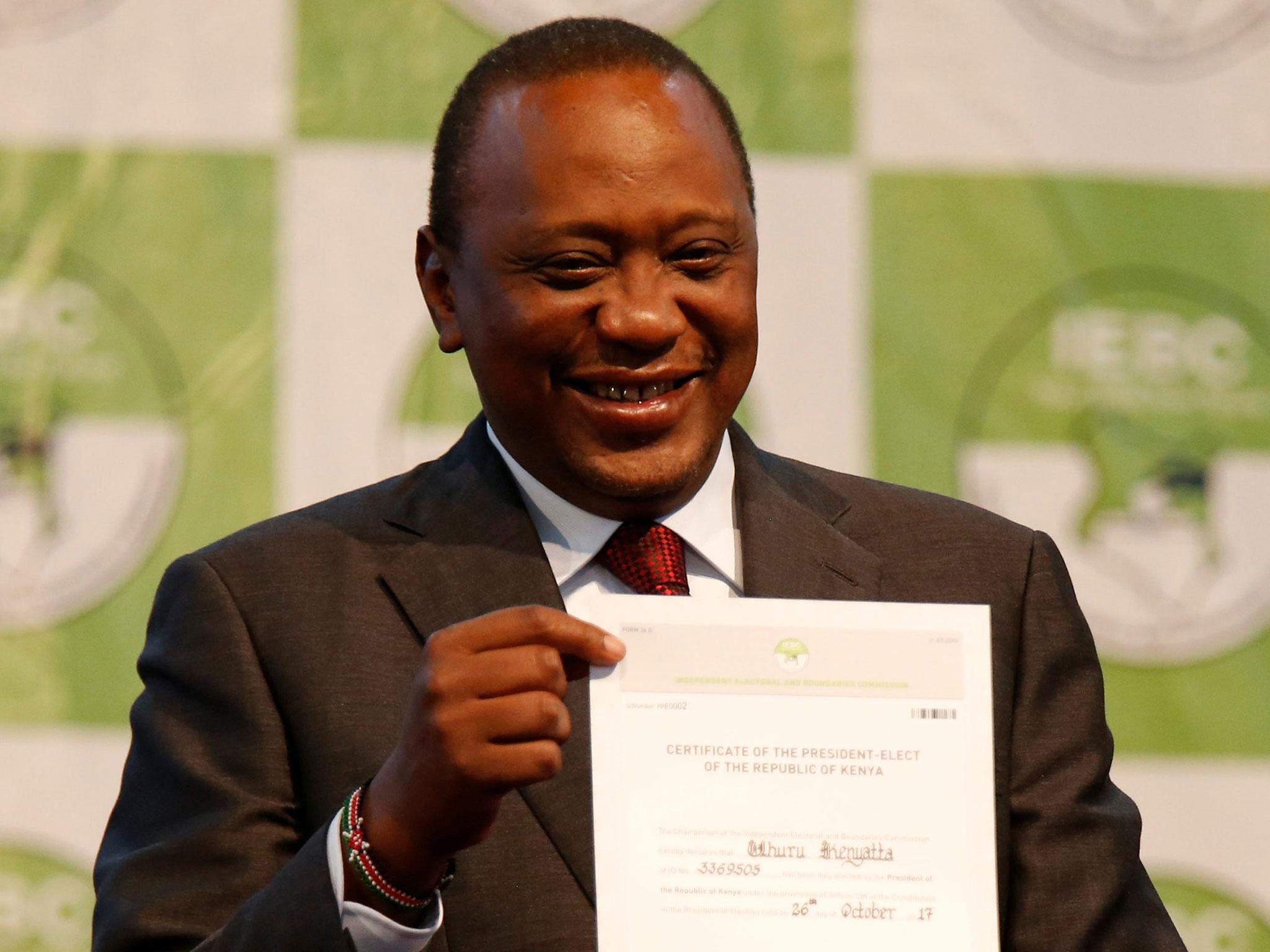Kenya elections: President Uhuru Kenyatta wins 98% of re-run vote
Incumbent claims victory in ballot boycotted by opposition leader Raila Odinga

Your support helps us to tell the story
From reproductive rights to climate change to Big Tech, The Independent is on the ground when the story is developing. Whether it's investigating the financials of Elon Musk's pro-Trump PAC or producing our latest documentary, 'The A Word', which shines a light on the American women fighting for reproductive rights, we know how important it is to parse out the facts from the messaging.
At such a critical moment in US history, we need reporters on the ground. Your donation allows us to keep sending journalists to speak to both sides of the story.
The Independent is trusted by Americans across the entire political spectrum. And unlike many other quality news outlets, we choose not to lock Americans out of our reporting and analysis with paywalls. We believe quality journalism should be available to everyone, paid for by those who can afford it.
Your support makes all the difference.Incumbent President Uhuru Kenyatta won 98 per cent of the vote in a repeat presidential election in Kenya, although only 39 per cent of voters turned out due to an opposition boycott, the electoral commission said on Monday.
The announcement provoked small protests in a few opposition strongholds, but also celebrations in pro-Kenyatta areas of the east African country. Veteran opposition leader Raila Odinga had already branded the election a farce.
Given the deeply polarised atmosphere, some Kenyans fear that the violence seen so far – for the most part protesters clashing with police – is starting to take on ethnic overtones after two deaths in clashes between rival groups at the weekend.
On Monday, the US ambassador said Washington was “profoundly concerned” by the outbreaks of violence in Kenya – east Africa’s biggest economy and a key security ally of the West against militant Islam – since the re-run election on 26 October.
In his victory speech, Mr Kenyatta repeated his belief that his victory in the original 8 August election – later nullified by the Supreme Court due to a string of irregularities – was legitimate and said dialogue would have to wait if the opposition was going to lodge court cases again. “My victory today is just part of a process that is likely to once again be subjected to a constitutional test through our courts ... I will submit to this constitutional path regardless of the outcome,” Mr Kenyatta said.
“Those who are going to ask me: ‘Are you going to engage in dialogue?’ ... Let them [the opposition] first and foremost exhaust all their constitutional options.”
Mr Kenyatta took 98 per cent of the vote, results from 266 out of 291 constituencies showed. The electoral commission said 7,616,217 valid votes were cast, representing 39 per cent of the 19.6 million registered voters.
Protests by Mr Odinga’s supporters prevented polling stations from opening in 25 constituencies.
The election commission said that poor security prevented balloting in those areas but the final announcement could go ahead as it would not “materially affect” the result.
As the election commission began reading results on Monday, around 100 youths listening through their mobile phones gathered in Nairobi’s Kawangware slum, chanting ”No Raila No Peace”.
As soon as the outcome was announced, protesters lit a bonfire in the middle of the street and began taunting riot police with cries of “the people want tear gas”.
Earlier in the day, police dispersed protesters there with tear gas when they tried to block a visit to Kawangware by Interior Minister Fred Matiang’i.
In another Nairobi shanty town, Mathare, the scene of deadly clashes between police and protesters immediately after the August vote, social worker Ann Mbuthia, 58, told Reuters before the results were known that women were hurrying home.
“We are afraid because here in Mathare youth are ready to fight if Uhuru [the winner] is announced,” she said. “Women are afraid to come out of their houses.”
And in the western city of Kisumu, Mr Odinga’s political heartland, around 50 youths began to block the road at the Kondele roundabout, the epicentre of protests, while others banged metal poles together. But the protest was small.
“What can I do? They’ve already announced it. Even if I burn tyres, nothing will change,” said 25-year-old labourer Kennedy Omondi as he watched young men set a barricade alight.
Mr Odinga pulled out of last week’s vote, saying the electoral commission had failed to institute reforms to forestall the kind of “illegalities and irregularities” that scuppered Mr Kenyatta’s victory in the August election.
Kura Yangu Sauti Yangu, a coalition of civil society organisations with 2,000 election observers, said there were “multiple” cases where results from polling stations differed from results on the forms posted on the election portal after last week’s vote.
In a report, they supplied a photo taken by their observers of the tally sheet for Bashaal market centre in Garissa. It showed 133 votes for Mr Kenyatta while the form displayed online showed 433 votes.
Another form posted on the election website, from Tumbeni primary school in Kakamega, showed four votes for Mr Odinga and two for another minor candidate but recorded the total number of votes cast was 77 votes cast.
Reuters
Join our commenting forum
Join thought-provoking conversations, follow other Independent readers and see their replies
Comments